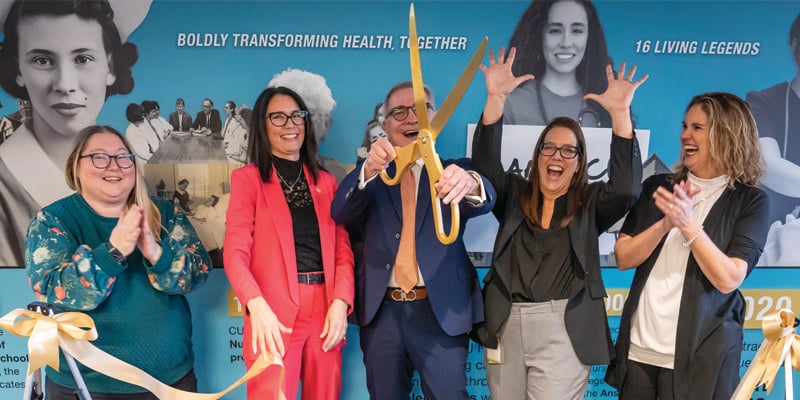Mia Roberts, PhD, CPNP-PC, stood in front of a crowd of about 60 University of Colorado College of Nursing PhD students and faculty, prepared to present her doctoral dissertation for only the second time.
Interested in Earning a Doctor of Philosophy (PhD) Degree in Nursing? |
|
Roberts graduated with a Doctor of Philosophy in Nursing with a specialty in Health Care Systems Research in May 2023. She was asked to present her dissertation, titled “Optimizing Adolescent Mental Health Treatment,” during the Fall 2023 PhD Intensives week on the Anschutz Medical Campus.
“It was surreal and a big honor to share this with the students who are in the program currently and to CU Nursing’s faculty,” Roberts says. “It was an honor to have been asked – to feel like when you graduate, ‘Now I’m on the other side of this”, and is this work meaningful outside of my own little bubble?”
Her study was conducted over four months this past spring at CU Nursing’s Sheridan Health Services. Roberts has worked there since 2017 and serves as a Senior Instructor of Clinical Practice and is the pediatric clinical lead for their Family Health Clinic.
The Importance of a “Warm Handoff”
She looked at an intervention called a warm handoff in adolescent patients. A warm handoff is when a medical provider identifies a mental health issue with a patient. A behavioral health provider is brought in to assess the patient, provide resources/support, and to schedule them for a behavioral health appointment, if indicated. Sheridan Health Services conducts warm handoffs for all patients when a mental health concern is identified.
“What I sought to do was clarify the intervention, to understand how adolescents experience the intervention, and to measure whether or not the intervention leads to higher attendance rate at the initial behavioral health appointment,” Roberts says.

CU College of Nursing faculty Mia Roberts, PhD, CPNP-PC |
Her study found adolescents who received a warm handoff and met with a provider in the moment were not as likely to attend their initial appointments. Roberts says this was the opposite of what she expected.
“It’s because in that moment, in that handoff, they get their needs met and they actually are supported, so it speaks to the importance of warm handoffs in all clinics to meet acute needs of patients more holistically,” she says. Roberts would have a follow-up appointment with participants after they received a warm handoff.
She also says the study’s findings reinforce the structure used at Sheridan Health Services.
“The study provides findings that support the work we do, which is incredible,” she says. “It doesn’t change the way we do things, but it reinforces the importance of the work that we do.”
Roberts says this is why she wanted to pursue her PhD. She was working within a specific clinical structure that was untapped – using warm handoffs with adolescents. She says there are high rates of mental health disorders in adolescents between the ages of 11 and 21.
“They are such a special group of people who have high needs, and being able to find ways to support them appropriately in a way that will impact their outcomes across their lifespan is something that I don’t take lightly,” she says. “I find the power of being able to study these interventions that can support them better.”
Mia Roberts’ Advice for Incoming PhD students:
- Lean into the coursework and every opportunity presented to you
- Your colleagues are key
“I met with my colleagues once every other week when we were writing to support one another and answer questions. This gave us the motivation to keep going and to keep writing.” - Partner with your faculty and your committee
“These are the people who can help to focus or clarify your study. They can support you to make sure what you defend for your dissertation is meaningful, makes sense, and is applicable. They can also help you clarify those things, and you should lean into their expertise.” - Stay focused on the end goal and stay true to science
- Remember that you’re doing the work
“When you think “I can’t do this anymore” …well, you’re doing it! You’re in the moment, you’re submitting to discussion boards, you’re posting the assignment, and you’re in it, you’re doing it.”



